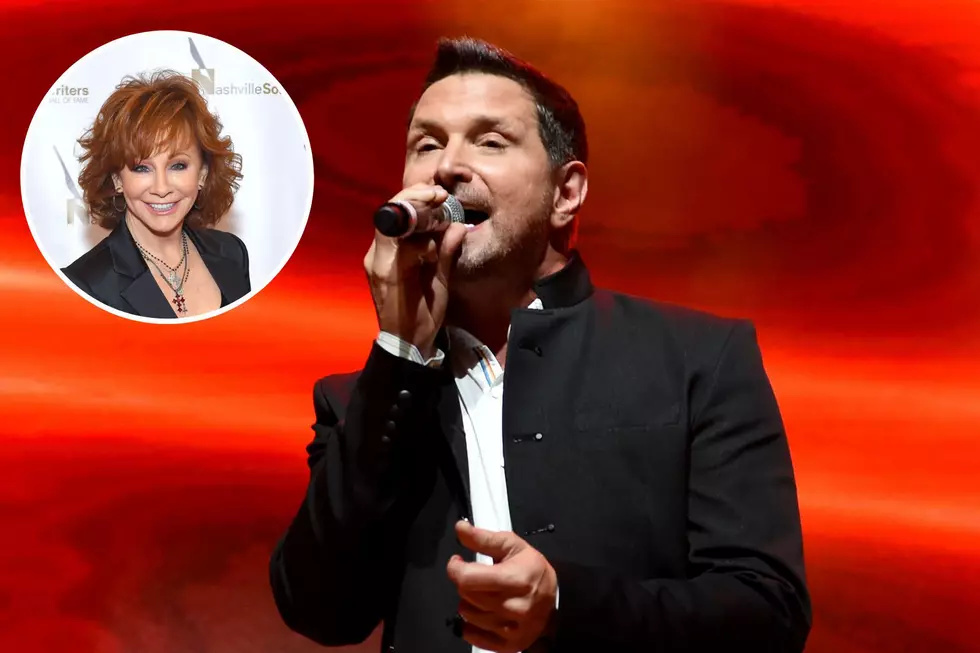![Ty Herndon on the Day He Decided to Die + the Diagnosis That Changed Everything [Listen]](http://townsquare.media/site/204/files/2022/07/attachment-ty-herndon-press-image.jpg?w=980&q=75)
Ty Herndon on the Day He Decided to Die + the Diagnosis That Changed Everything [Listen]
Ty Herndon remembers the details. He'll describe the exact moment he knew he was bound for a relapse and what it felt like to decide he was going to die. Then, he'll recall the sudden quiet that came when an undiagnosed mental illness was diagnosed and then properly medicated.
Only a songwriter could share these details like poetry. Only a country music songwriter could turn that poetry into a story every single person in America can relate to.
As the COVID-19 pandemic raged in 2020 and 2021, it made sense to think a body of art would emerge afterward that summed up this experience in America. It's happened before. After 9/11 a canon of songs emerged, led by Alan Jackson's "Where Were You." After the 2008 financial collapse, records from Bruce Springsteen and songs from blue-collar country singers like John Rich stamped the requisite truth onto those famous three chords. Thus far, the response from country musicians has been to try to forget about it.
Intentionally celebratory albums from Thomas Rhett, Carrie Underwood and Walker Hayes have driven country music culture this year. Rhinestones and blue surf dominate country radio, not woeful truths about the modern ties that bind: depression, illness, financial collapse and death. Enter Herndon, now sober and set to begin what one could describe as his fourth act in this business.
"I actually became a little ashamed of my stories because I sat in my house one week with 140 tour dates, a book deal, a made-for-TV telling my story, it was all laid out," he tells Taste of Country. "And three days later it was all gone. It was like a career tornado."
"I thought to myself, 'I'm not going to get out of this alive.' And a calmness came over me, man. It was the most peaceful thing. I made a decision that I was gonna leave this earth."
It was the career tornado that followed a literal tornado that first set into motion a set of events that led to him sitting in his apartment that New Year's Eve holding 27 Ambien pills, preparing to check out. Herndon shared this story in detail with People last month, wondering himself how exactly a call was made that would actually save his life and send him to a treatment facility in Houston.
"Dr. Flowers said," Herndon shares, "'Man, I gotta tell you. You may have walked in here, but your soul was on a gurney. Your soul had flatlined.'"
On Friday (July 15), Herndon's Jacob album drops, and it doesn't hide the hurt. Only one song called "God or the Gun" is an actual accounting of the physical and mental pain that's led most interviews with him recently. More than anything, this is a breakup album, as after all of this, Herndon and his partner of 11 years broke up last October.
Then you'll find the hard-earned celebration, or at least a song that makes your feet shuffle in "Dents on a Chevy," a must-listen duet with longtime friend Terri Clark. "Till You Get There" is an inspiration. Herndon's still got a little swag.
"I just turned 60," he says. "I'm so happy to celebrate that number. I'm going to George Clooney that bitch."
Taste of Country: The new album is sort of a celebratory way to talk about dark things. Can you unpack a song like "Til You Get There" for us and explain why it's a good feeling?
Ty Herndon: It's a really weird thing for me. I just sat down with People magazine, four pages in the middle of the magazine. It's not even a bragging right. When I opened it up and looked at it and you see 30 years of your life laid out in an article that says, "I know I shouldn't be alive today," and you see all of that ... I sat down and took a look at it and was like, "Holy crap. I don't know whether to cry or be proud of this." Where I landed was, what a life.
How did coming out eight years ago compare to sharing your battle for sobriety?
There wasn't all that darkness in coming out. I was in a place in my life where I was ready to tell my story. The blood and bones weren't fitting together very well, and they have to work together. Your heart and your brain have to work together.
Chely Wright was my absolute savior. She still is. I call her Mother Wright when I need a little advice about something. And she's always said, "Keep it real. The truth will set you free, but telling the truth about your authenticity can also have moments that it can be really painful." I was not wanting to feel any more pain, that's for sure. But the pain would outweigh what I was feeling in my life. If I don't get to sing country music anymore because I'm gay, then I guess I'll just sing it to my family. Nothing will ever take that gift from me.
"The noise in my head has been so loud my whole life that I'd gotten so used to it that I could hear nothing else. It was like a swarm of bees."
I imagine people came to you with their stories after you came out and now again as you've shared your battle with addiction. Can you share any that are remarkable?
I can't. Within the program, anonymity is a big deal. But I can tell you they mirror a lot of what I've been through. The path leads to the same place. Addiction leads to death, and we all have survival stories.
Circling back to COVID. That week (on March 3, 2020), the tornado had hit East Nashville and wiped out our neighborhood, and it was just Armageddon. I understood immediately, I thought to myself, 'I know I'm going to relapse.' It had been 18 years, and I could no more tell you anywhere to buy drugs but ... it was a relapse that lasted a week because when you're really, really hurting and really, really sad, I always said that drugs were my medicine. I didn't want to know my real life. I was just dumping things in my system.
I never missed a show. I never forgot a word. I don't even know, man. It was just a different machine. Something set in on me that needed to go away, like a space alien. (I) talk to many people who may have relapsed after many years of sobriety. You're drinking or doing it for a different reason, so it doesn't feel the same. You just mirrored the pain.
I thought to myself, 'I'm not going to get out of this alive.' And a calmness came over me, man. It was the most peaceful thing. I made a decision that I was gonna leave this earth. You know, I did it. I'm leaving a legacy of music. I'm leaving some pretty good things behind. My family is peaceful. My nephew is grown. It's a good time to go. People are going to remember you in a good place.
We hear you share these emotions in "God or the Gun" on the new album. Are there others that are more subtle that also explain what you were going through?
No, that song explained the moment. I only wanted to go there for that song. That's the first song that we wrote, sitting in the same spot of my living room floor where it (his attempt to take his own life) almost took place.
Does telling this part of your story help keep you accountable?
Yes. I wear it with a badge of honor now. These last 18 months of my life, I am sobriety. I was playing the role of sobriety before. I was so damaged I didn't want to add to the pile. Another thing. It's so interesting to me. I had somebody ask me, what's it like to be wearing your scars so proudly. I said, "What did you say?" That fits. I've never felt such freedom that I'm bringing my blood, bones and scars center stage.
When you were diagnosed as bi-polar, did you look back and go, "Oh, this all makes sense"?
I did. The noise in my head has been so loud my whole life that I'd gotten so used to it that I could hear nothing else. It was like a swarm of bees, and I was — some of my friends were like, "Well, we could have told you that." Well, why the f--k didn't you? (Laughs). I've become a cusser in sobriety, it just goes together.
It's late in life to be diagnosed.
Very. Let me tell you something, man, on the second week of a med that worked for me — you've seen the movie Silence of the Lambs? It was like the lambs were silent. I could carry a conversation. I could sit still and talk to you. I'm just the most awkward, squirmy guy you've ever met in your life. There were tics. I had to become very, very focused on you just to be able to sit there and say, "What are we going to talk about today?" I didn't understand that.
What is different about sobriety now that makes you sure you won't relapse again?
There's a thing called dry-drunk as well. Just because I wasn't drinking or drugging doesn't mean I wasn't having the stinking-thinking and miserable in my own temple. I had to rebuild this town. I tore everything down except a little bit of the foundation, because those are your lessons. In this new town, there's a bar. I own it. I don't drink in it.
See 50 Essential '90s Country Songs
More From 102.3 The Bull

![Maddie & Tae, Chapel Hart + More Unite for 2023 Concert for Love & Acceptance [Pictures]](http://townsquare.media/site/204/files/2023/06/attachment-concert-for-love-and-acceptance-2023.jpg?w=980&q=75)





